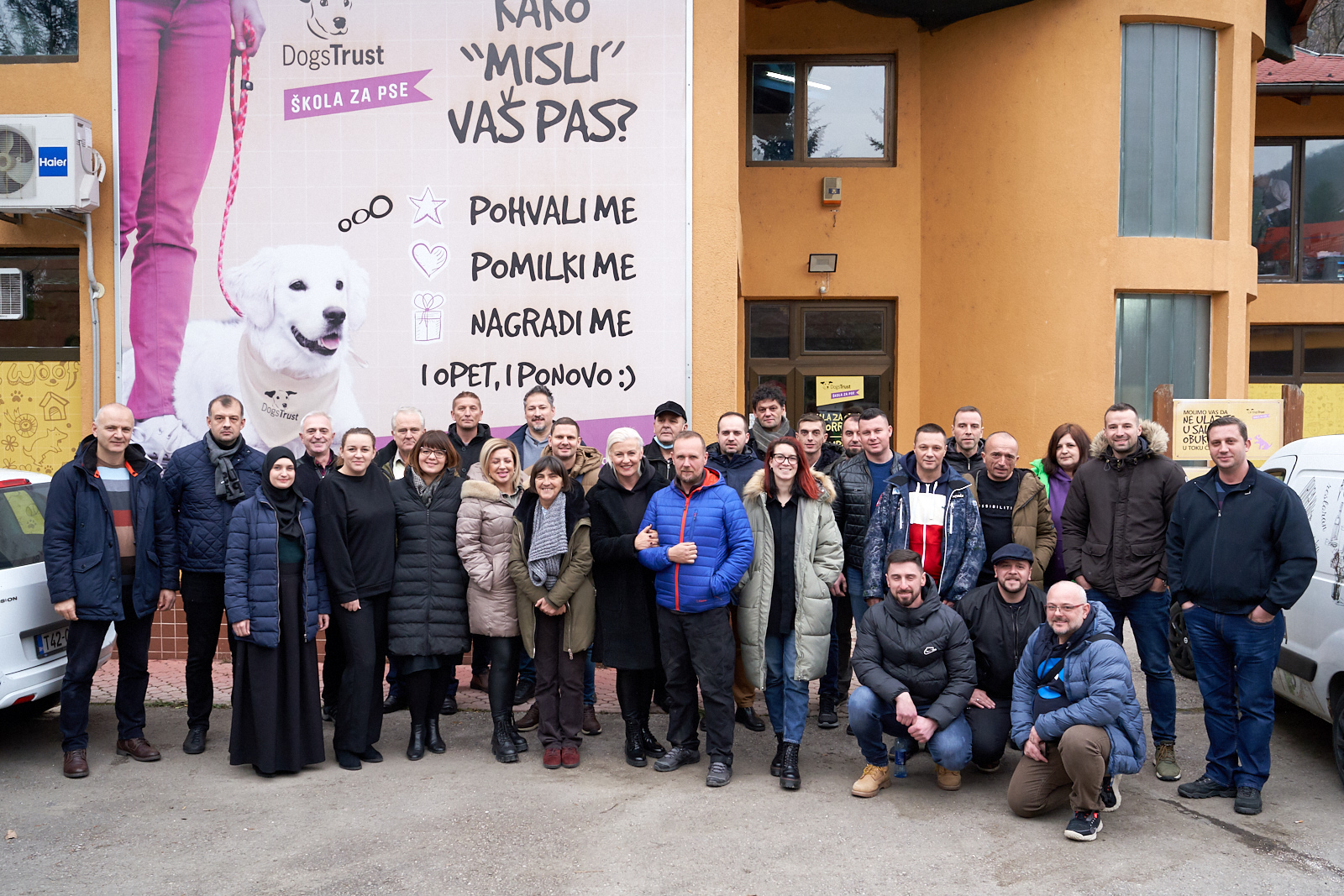Professional training held to improve the welfare and the possibility of rehoming of dogs from BiH shelters

The Integrated Local Development Project (ILDP), a joint project of the Government of Switzerland and the United Nations Development Programme (UNDP) in Bosnia and Herzegovina, and the Dogs Trust in BiH, supported the initiative of the state Veterinary Office to ensure a higher level of animal welfare in shelters in BiH through training aimed at increasing the possibility of rehoming of dogs residing therein.
The two-day training intended for workers and veterinarians in shelters and veterinary inspectors was held on Tuesday and Wednesday, 21 and 22 December 2021, at the Dogs Trust School for Dogs and with the assistance of Dogs Trust trainers for dog training, by DVM Dunja Kovač, behaviourist, expert in assessing the degree of socialization of dogs and conducting behavioural changes.
The need for this training is only one of the aspects in which shelter in BiH needs improvement, and it arose from an expert report on the situation in shelters in BiH.
According to Dr. Kovač, working with dogs in shelter conditions is very different from working with owned dogs, primarily because dogs that get into shelter often have unknown history and psychophysical status.
"Just as we assess a dog's physical health and perform health analyses when admitting him to a shelter, we also assess its mental status through standardised behavioural assessment tests,"; she said, explaining that this assessment should first ensure the animal's mental well-being in shelter conditions by treating the animal in accordance with his temperament and character; secondly, this assessment increases the chance of rehoming through finding the ideal home based on a match with the temperament and character of the adopter. This is exactly the kind of rehoming method Dogs Trust uses in its programme for rehoming, except that dogs that find a home under this Dogs Trust scheme do not come from shelters.
"In addition to this type of assessment, there are also programmes for behavioural changes that come as part of this training, which enable shelter employees, if it is assessed that the dog needs additional work, to act in such a way as to minimize the observed behavioural problems until rehoming, which enables better control and handling of the animal even after rehoming," says Dr. Kovač.
She remarks that every dog in the shelter is obliged to undergo this behavioural assessment in order to be declared eligible for a safe and successful rehoming.
Dr. Kovač remarks that this assessment is twofold, and that it is performed "on the third and 24th day of stay in the shelter; only after the second behavioural assessment, the dog can receive confirmation that he is ready for rehoming and transport".
The theoretical part of the training consisted of: basic principles of animal welfare, dog body language, communication between man and dog, the influence of fear and anxiety felt by the dog on his behaviour; the practical part instead, before which the participants were introduced to the work of the Dogs Trust School for Dogs, was focused on the topics of basic socialization of the dog and the use of positive motivation in this process, as well as the components and settings of behavioural assessment of dogs.
In the practical part, participants had the opportunity to test their acquired knowledge under the supervision of experts, while at the end of the training there was a conversation about the practical part and a theory test.
Improving the welfare of dogs in shelters ensures better implementation of the Law on Animal Protection and Welfare in BiH and other relevant legislation and by-laws, thus contributing to a more efficient, humane and lasting solution to the problem of stray dogs.
"The Veterinary Office of BiH is committed to the systematic and consistent implementation of the Law on Animal Protection and Welfare in BiH, because this is the only way to solve the problem of stray dogs permanently," said Animal Welfare Inspector Inga Dujmović, emphasizing that adopting dogs from registered shelters with quality standard procedures that ensure animal welfare, and adopting them into an adequate home is one of the most important and permanent elements of this systematic solution, which is also why raising the capacity of shelter staff is so important. "I hereby thank the Integrated Local Development Project (ILDP), which is a joint project of the Government of Switzerland and the United Nations Development Programme (UNDP) in Bosnia and Herzegovina, and the Dogs Trust in BiH, for supporting this initiative and continued cooperation," said Mrs. Dujmović.
For almost 10 years, the Dogs Trust Foundation in BiH has been voluntarily, but significantly and directly helping through a legal and humane solution of the problem of stray dogs thanks to its programmes.
We are pleased to host and partly participate in this important training and we welcome the initiative of the Office and the support of the ILDP, especially since in our School for Dogs we educate the owners to train their pets on the principle of positive motivation, and in our Fostering Rehoming Programme we use the method of "matching" that allows to find the ideal combination of the owner and the dog they are adopting.
